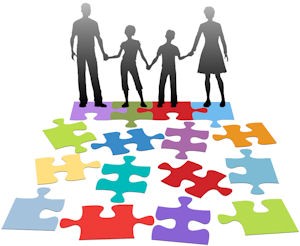

People come to counselling and psychotherapy with all types of personal and relationship difficulties. Individuals often decide to come to therapy at the point when they feel distressed, upset, sad, hurt, depressed or angry. Some individuals and couples may be struggling with a sense of shame or fear about what’s happening in their lives or relationships. The sense of loss and powerlessness can occur in many types of relationship. For example, work relations with family members or with an intimate other. What counselling does is help the person or couple to have that conversation they can’t have in their everyday setting.
Working with a qualified and highly trained therapist affords you the necessary freedom to speak openly and in private. The therapist will remain unbiased at all times. The therapy room will create a safe and a confidential setting. This time and space will guide you towards taking more appropriate steps towards a fuller and manageable life with self and with others. It can help you understand where things went wrong and facilitate you find a way out of your current situation.
What is Psychotherapy?
Psychotherapy is an intervention that allows safe
exploration of worries, behaviours, and thoughts that may leave you feeling
anxious, troubled or upset. In the course of several sessions you are invited
to share your deepest feeling in your own time and at your own pace. The therapist will be your trusted companion
who will guide you as you explore the sources of your issues in a
non-judgemental way. Depending on your
goals, it may be necessary to go beyond the initial problem and identify any
underlying causes so you can work towards resolving both immediate and
long-term issues. It is hoped that over
a short period of time you will build a rapport and trust with your
therapist. The primary aim of the
therapist will be to accept and support the client/s no matter what they say or
do, placing no conditions on this acceptance within the therapeutic
environment. These settings will help to empower you to reflect on fundamental
questions related to your situation. The therapist will encourage you to
uncover how you are really feeling and to identify specific ways of thinking,
as well as behavioural patterns, when coping with difficulties. The
psychotherapist does not provide advice on what clients should do because each
individual is unique, and everyone is at a different stage in their life. The
purpose of the therapy is ultimately in the clients’ hands. In the words of
Carl Rogers “the client knows what’s best”.
General Counselling and Psychotherapy:
Any issue can be explored in general counselling. General counselling is flexible, and is usually a medium to long term therapeutic process as determined by the client. This allows a deeper, meaningful exploration of the client's issues. Although most clients choose to come for therapy at the time of high anxiety, distress or a crossroads in life, there is also an increasing number of people undergoing counselling/psychotherapy as means of self-development. This entails seeking to understand themselves better, learn how to create more fulfilling relationships and how to live in a more authentic, rewarding way.
Cognitive Behavioural Therapy (CBT):
Simply speaking, CBT is a form of structured, goal-oriented, and short-term therapeutic modality, which is currently recommended for most specific emotional issues. CBT is based on an idea that thoughts, feelings and behaviours are interconnected and that by changing the way we think about our reality, we also change the way we feel about ourselves and the world around us. The essence of cognitive therapy is to identify and to examine underlying unhelpful beliefs that are responsible for person's emotional distress and to generate alternative, more balanced thoughts.
Couples Counselling:
Couples counselling and marriage guidance is a form of
therapy that looks to improve communication and resolve issues within an
intimate relationship. In contrast to counselling for relationship issues,
which can be undertaken solely through individual sessions, couples counselling
is a term applied to talk therapy for two people within a relationship. It is
important to remember that when you go to couples counselling you will not
simply be told what to do. Your counsellor/therapist is unlikely to offer their
personal opinion and you will not be told whether or not you should separate.
The role of a couple’s counsellor is to facilitate change and resolution by
helping you both to communicate more effectively and reach your own conclusions
under the guidance of a professional. There are many different concerns that
may bring you to couples counselling, ranging from a lack of communication
right through to a betrayal or affair. Some common issues that can be explored
through couples counselling include: lack of trust, betrayal or affair,
jealousy, lack of communication, financial issues, work-related stress,
different sexual needs or other sexual issues, family conflicts, different
goals and values, different parenting styles, life changes,
Psychodynamic Counselling and Psychotherapy:
Psychodynamic counselling and psychotherapy are based on the original "talking cure" based on Sigmund Freud's practice and writing. The idea is to provide a space for you to explore your present situation and emotional state, in the belief that perhaps some of your difficulties may be linked to your past. However, it is a misconception that people in counselling and psychotherapy only talk about their past. What is happening in your life now, and what has brought you to therapy, is extremely important. Psychodynamic psychotherapy and counselling allows people time and space. The therapist will recognize that painful emotions can be very difficult to process, not only at the beginning of therapy but also when recalled and reworked.
Some of the issues which may bring you to counselling/psychotherapy include:
Depression, Stress, Bereavement and Loss, Anger, Anxiety, Bullying, Eating Disorders, Low Self-Esteem, Trauma, Work Related Issues, Suicidal Thoughts, Bipolar Disorder/Manic Depression, Abortion, Abuse, Borderline Personality Disorder, Disabilities, Domestic Violence, Gender Identity, Generalized Anxiety, Grief and Loss, Low Self-Confidence, Panic Disorder, Relationship Issues, Family Issues, Self-Harm, Separation and Divorce, Sexual Issues, Sexuality.
It is often the case that the symptoms of personal issues may be quite visible, however, the causes frequently tend to be deep rooted for many people who are struggling to cope in daily life. We often know something is wrong, but we cannot name it. Contacting and meeting with a professional counsellor/psychotherapist can prove to be invaluable by means of support, relief, comfort and well-being.